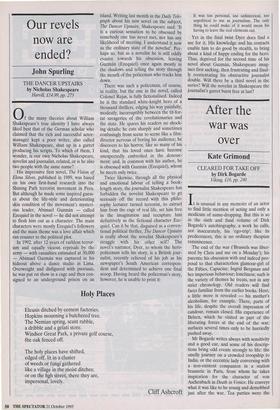Our revels now are ended?
John Spurling
THE DANCER UPSTAIRS by Nicholas Shakespeare Harvill, £14.99, pp. 273 Of the many theories about William Shakespeare's true identity I have always liked best that of the German scholar who claimed that the rich and successful actor- manager kept a poor writer, also called William Shakespeare, shut up in a garret producing his scripts. To which of them, I wonder, is our own Nicholas Shakespeare, novelist and journalist, related, or is he also two people with the same name?
His impressive first novel, The Vision of Elena Silves, published in 1989, was based on his own first-hand research into the Shining Path terrorist movement in Peru. But although he made some inspired guess- es about the life-style and deteriorating skin condition of the movement's mysteri- ous leader, Abimael Guzman — called Ezequiel in the novel — he did not attempt to flesh him out as a character. The main characters were mostly Ezequiel's followers and the main theme was a love affair which ran counter to the political plot.
In 1992, after 12 years of ruthless terror- ism and equally vicious reprisals by the army — with casualties estimated at 30,000 — Abimael Guzman was captured in his hideout above a dance studio in Lima. Overweight and disfigured with psoriasis, he was put on show in a cage and then con- signed to an underground prison on an island. Writing last month in the Daily Tele- graph about his new novel on the subject, The Dancer Upstairs, Shakespeare said: 'It is a curious sensation to be obsessed by somebody one has never met, nor has any likelihood of meeting. I understand it now as the ordinary state of the novelist'. Per- haps so, but as a novelist he is still oddly evasive towards his obsession, leaving Guzman (Ezequiel) once again mostly in the shadows and telling the story through the mouth of the policeman who tracks him down.
There was such a policeman, of course, in reality, but the one in the novel, called Colonel Rejas, is fully fictionalised. Indeed he is the standard white-knight hero of a thousand thrillers, edging his way painfully, modestly, incorruptibly between the tit-for- tat savageries of the revolutionaries and the state. He spares his readers no shock- ing details; he cuts sharply and sometimes confusingly from scene to scene like a film- director nervous of boring his audience; he discovers to his horror, like so many of his , kind, that his loved ones have become unexpectedly embroiled in the denoue- ment; and, in common with his author, he is obsessed with Guzman (Ezequiel), whom he meets only twice. Twice likewise, through all the physical and emotional labour of telling a book- length story, the journalist Shakespeare has forbidden the novelist Shakespeare to go seriously off the record with this philo- sophy lecturer turned terrorist, to extract him from the cage of real life, set him free in the imagination and recapture him definitively as the fictional character Eze- quiel. Can it be that, disguised as a conven- tional political thriller, The Dancer Upstairs is really about the novelist Shakespeare's struggle with his other self? The novel's narrator, Dyer, to whom the hero- policeman tells his story, is a British jour- nalist, recently relieved of his job as his newspaper's South American correspon- dent and determined to achieve one final scoop. Having heard the policeman's story, however, he is unable to print it: It was too personal, too unhistorical, too unpolitical to use as journalism. The only thing he could make of it would mean his having to leave the real elements out.
Yet in the final twist Dyer does find a use for it. His knowledge and his contacts enable him to do good by stealth, to bring about a kind of happy ending for the hero. Thus, deprived for the second time of his novel about Guzman, Shakespeare imag- ines first sacking, then frustrating and final- ly reorientating his obstructive journalist double. Will there be a third novel in the series? Will the novelist in Shakespeare the journalist's garret burst free at last?










































































 Previous page
Previous page